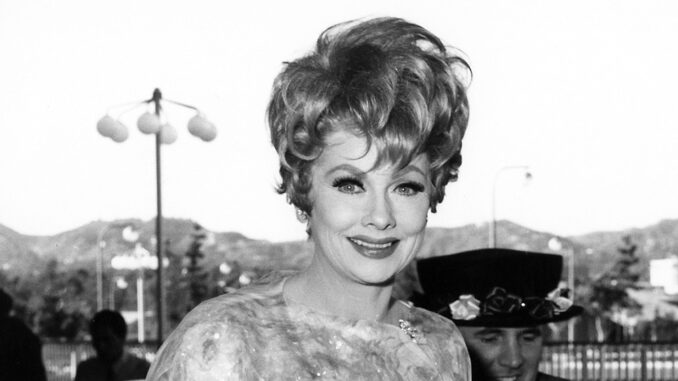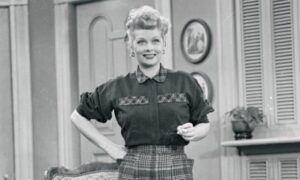
Introduction
When I Love Lucy aired its final episode in 1957, fans wondered: What would Lucille Ball do next? After all, she wasn’t just the star of one of the most beloved TV shows in history—she was a cultural icon. But instead of resting on her laurels, Ball took her career to unprecedented heights. This article explores how Lucille Ball transformed herself from sitcom royalty into one of Hollywood’s most influential figures.
The End of an Era: Saying Goodbye to I Love Lucy
A Bittersweet Farewell
After six successful seasons, I Love Lucy concluded in 1957, leaving behind a legacy of laughter and innovation. The show broke barriers, from its unique filming techniques to its portrayal of a multicultural marriage. However, Ball and her co-star (and then-husband) Desi Arnaz decided it was time to end the series, partly due to their personal struggles.
The Legacy of Lucy Ricardo
Ball’s portrayal of Lucy Ricardo made her a household name, but she wasn’t content to be remembered as just one character. She was ready to expand her influence beyond acting.
Lucille Ball’s Next Act: Founding Desilu Productions
The Business Visionary
Lucille Ball didn’t just star in television—she became a powerhouse behind the scenes. After the end of I Love Lucy, Ball and Arnaz focused on their production company, Desilu Productions. This company would play a pivotal role in shaping the television industry.
Desilu’s Game-Changing Hits
Under their leadership, Desilu Productions was responsible for producing iconic shows like The Untouchables and Mission: Impossible. These programs solidified the studio as a major player in Hollywood.
Lucille Ball Takes the Helm
In 1962, following her divorce from Arnaz, Ball bought out his shares in Desilu, becoming the first woman to run a major television studio. Her leadership paved the way for future hits, including Star Trek.
Returning to the Screen: The Lucy Show
A Fresh Start
Ball wasn’t ready to leave acting behind. In 1962, she returned to television with The Lucy Show, which reunited her with co-star Vivian Vance. This series allowed Ball to evolve as an actress while keeping her comedic charm alive.
Critical and Commercial Success
The show became a hit, proving that Ball’s star power hadn’t waned. It also highlighted her ability to adapt to changing times in the entertainment industry.

Breaking Barriers for Women in Hollywood
Pioneering Leadership
By taking over Desilu Productions, Ball shattered the glass ceiling in an industry dominated by men. She proved that women could succeed not only in front of the camera but also in boardrooms.
Mentorship and Inspiration
Ball’s trailblazing efforts inspired countless women in entertainment. Her determination showed that success is about more than talent—it’s about vision and resilience.
A Brief Pause: Lucille Ball’s Personal Life
Focusing on Family
After her divorce, Ball took time to focus on her children, Lucie Arnaz and Desi Arnaz Jr. Balancing motherhood with a demanding career was no small feat, but Ball managed to excel in both arenas.
Finding Love Again
In 1961, Ball married comedian Gary Morton, who provided support as she navigated her new roles in life and business.
Lucille Ball’s Impact on Pop Culture
The Queen of Comedy Lives On
Even as she transitioned into other ventures, Ball’s influence on comedy remained unparalleled. She continued to inspire comedians with her impeccable timing and fearless approach to humor.
A Role Model for Generations
Ball’s ability to reinvent herself resonated with fans and colleagues alike. Her story became a testament to perseverance and innovation.
Challenges Along the Way
Navigating Divorce and Industry Doubts
The end of her marriage to Arnaz was difficult, but Ball refused to let it define her. She faced skepticism about her ability to lead Desilu Productions, but her success silenced critics.
Staying Relevant in Changing Times
The entertainment world was evolving rapidly, but Ball adapted by embracing new opportunities and challenging herself creatively.
Lucille Ball’s Later Career
Life With Here’s Lucy
In 1968, Ball launched another hit series, Here’s Lucy, which co-starred her real-life children. This show further cemented her status as a television legend.
Broadening Her Horizons
Ball also appeared in movies and made guest appearances on various programs, showcasing her versatility as a performer.
The Enduring Legacy of Lucille Ball
More Than a Comedian
Ball’s impact extended far beyond her comedic talent. She proved that women could excel in every facet of the entertainment industry, from acting to producing.
Influence on Modern Television
Without Ball’s leadership at Desilu, beloved franchises like Star Trek might never have existed. Her contributions continue to shape the TV landscape.
Conclusion
Lucille Ball’s journey after I Love Lucy ended is a story of resilience, reinvention, and breaking barriers. Far from resting on her laurels, she became a trailblazer in Hollywood, proving that her talents extended well beyond acting. Whether as a performer, producer, or studio executive, Ball left an indelible mark on the entertainment industry.
FAQs
1. What made Lucille Ball a trailblazer in Hollywood?
Lucille Ball became the first woman to run a major TV studio, Desilu Productions, proving that women could excel in leadership roles in the entertainment industry.
2. What shows did Desilu Productions create after I Love Lucy?
Desilu produced iconic series like Star Trek and Mission: Impossible, which remain cultural landmarks.
3. Why did Lucille Ball and Desi Arnaz end I Love Lucy?
The series ended due to personal struggles between Ball and Arnaz, as well as their desire to explore new opportunities.
4. Did Lucille Ball have any hit shows after I Love Lucy?
Yes, she starred in successful series like The Lucy Show and Here’s Lucy, continuing her reign as a television icon.
5. How did Lucille Ball influence future generations?
Ball’s trailblazing career inspired countless women in entertainment, demonstrating that success comes from perseverance, innovation, and courage.